Years of political and legal battles over same-sex marriage could be decided with the unusual spectacle of the White House and Congress facing off before the US supreme court this week.
The nine justices will for the first time consider gay marriage in hearing two cases – one involving a California referendum barring gay marriage, and the other a federal law preventing the government from recognising same-sex unions. Both hinge on states' rights and constitutional guarantees of equality.
America's same-sex couples, and the politicians who have barred gay marriage in 30 states, are looking to the supreme court to hand down a definitive judgment on where the constitution stands on an issue its framers are unlikely to have imagined would ever be considered. But legal analysts warn that although opinion polls show growing public support for gay marriage, even those justices who favour change may choose to move slowly.
The cases
On Tuesday, the justices will hear arguments over California's ban on same-sex marriage after a 2008 referendum, Proposition 8, overturned a state supreme court decision in favour of gay unions, and amended the state constitution to say that "only marriage between a man and a woman is valid or recognized in California".
The following day, the court will consider whether a 1996 law passed by Congress blocking the federal government from recognising same-sex marriages, the Defense of Marriage Act (Doma), is constitutional.
That case has pitted the Obama administration against the Republican leadership in Congress. The White House said two years ago it would no longer defend Doma, which denies married gay couples – including members of the military – tax, financial and welfare benefits available to heterosexuals.
Congressional Republicans hired a lawyer – Paul Clement, the former US solicitor general who argued and lost the case against Barack Obama's healthcare reforms — to defend Doma. But one of the first things the justices have to decide is whether Congress has the authority, known as "standing", to even bring the case to the supreme court after the US Justice Department decided not to challenge an appeal court ruling striking down Doma as unconstitutional.
The challenge to Doma was brought by Edith Windsor, who was married to Thea Spyer in Canada in 2007. The couple lived in New York, where their marriage was recognised by the state government.
But when Spyer died in 2009, the federal government invoked Doma to force Windsor, who is now 83 and in poor health, to pay $363,000 in taxes on her late wife's estate – a charge she would have been exempt from if she had been married to a man.
Windsor's lawyer, Roberta Kaplan, will tell the supreme court she is not seeking to establish a right for same-sex couples to marry but to oblige the federal government to recognise those marriages in states that permit them.
"The point with Doma [is that] it's really unfair, unconstitutional and a violation of equal protection for the federal government for the first time in our country's history to have two classes of married couples. Married couples who are straight, who have real marriages that are recognised under federal law, and married couples who are gay whose marriages are completely unrecognised under federal law, who essentially have a second class form of marriage," she said.
Kaplan's argument is in part based on the equal protection clauses of the constitution.
While Kaplan's argument pushes the issue of equal protection to the fore, some legal scholars say it is underpinned by what amounts to a states' rights argument – that it is for individual states not the federal government to decide which marriages to recognise.
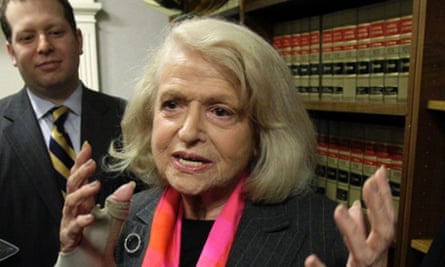
That is the same argument being pushed in the California case by opponents of gay marriage. In 2008, California voters endorsed Proposition 8 six months after the state's supreme court ruled in favour of same-sex marriage. Thousands of gay couples had already married by then.
In the tangled legal battle that followed, the state supreme court justices upheld Proposition 8's fatal blow to their own earlier ruling. But the federal courts waded in and ruled that California could not remove an existing right without a clear rational justification.
The legal action was brought by Kristin Perry who was denied permission to marry her partner, Sandra Stier, because of Proposition 8. But after the California state government refused to defend the bar on gay marriage following the appeals court ruling, various conservative and religious groups headed to the supreme court.
Gregory Katsas, a former US Justice Department official who has defended Doma in court, said that with the cases being held one after the other it will be difficult for the supreme court justices not to see a contradiction in the position of those who support gay marriage – on the one hand arguing for states' rights in New York while against them in California.
"Having both cases together, the challengers of Doma making the states rights' argument I think is going to ring a little bit hollow when one day earlier all of the same people on that side of the issue were making all of the same arguments for why states can not have a more traditional definition of marriage than the federal government," he said.
The possible outcomes
There are an array of possible rulings in both cases, with or without national implications.
In the Proposition 8 legal action, the supreme court could decide:
There is a constitutional right, under the equal protection clauses, for gay couples to wed, in which case the laws in 30 states prohibiting same-sex marriages are overturned.
The Proposition 8 ban on gay marriage is constitutional, leaving states free to decide the question for themselves.
That once California permitted gay marriage, it could not then take that right away. That would have no impact in the majority of US states that are determinedly against gay marriage, at least for now.
To uphold the Obama administration's position that California cannot go on recognising same-sex civil partnerships, with the same rights and burdens as marriage, without permitting gays to marry. That would also force seven other states that allow civil unions to introduce same-sex marriage but, again, have no impact on those states that ban gay nuptials.
In the Doma case, the supreme court could:
Find the law unconstitutional and so oblige the government to extend federal benefits to married same-sex couples in the nine states and the District of Columbia where gay nuptials are legal;
Find that Congress has no standing to defend the legislation and therefore make no ruling, in which case the appeals court judgement would stand and Windsor would get her $363,000 back;
Uphold Doma, and nothing changes.
Katsas said he is deeply sceptical about claims that Doma is unconstitutional but that there are also very real questions about whether Congress has the authority to fight to uphold it in the courts. But he said that a majority of the nine justices may in the end decide to move cautiously whatever their views on gay marriage.
"They could give a very clear answer one way or the other. They could say this is all just a political matter for the democratic process or they could say there is a constitutional right to gay marriage. There are lots of intermediate options, ways to split things. I don't think any of the intermediate options will prove stable over time although I do think there's a reasonable likelihood the court's instinct may be to try to move slowly," he said. "I think if the court adopts an intermediate solution it's because they want to constitutionalise gay marriage but just don't want to do it all in one step."
Kaplan warned that if the supreme court does not give a definitive ruling that could mean that "it's unlikely that at least for the rest of the Obama administration there would be any determination about constitutionality of Doma".
"And that obviously will present enormous practical problems for many many married couples in many states," she said.
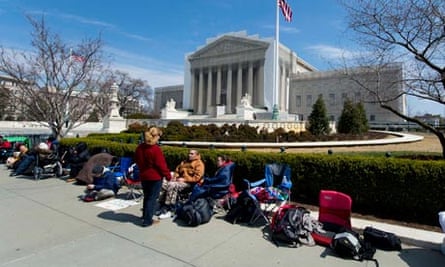
The competing sides
The cases have generated the same kind of passions seen at recent supreme court hearings on Obama's health care reforms and voting rights.
Among a slew of conservative and anti-gay organisations that have field briefs asking the supreme court to uphold Doma is the US Conference of Catholic Bishops. They are opposed by an array of interests seeking equal treatment including one representing same-sex spouses of military veterans.
Some business interests are also pressing for Doma to be overturned on the grounds that it forces them to discriminate against their workers.
Nearly 280 firms, chambers of commerce and city governments – including big names such Apple, Goldman Sachs, Levi Strauss and Xerox – have signed a brief in support of Windsor.
"Our law firm, like a lot of large employers, have got any number of gay employees who are legally married in states where we have operations and Doma creates a real burden," said Daryl Lapp, who signed the brief. "It's very complicated to administer benefits when you've got people who are legally married under state law but not legally married under federal law. The second thing is just as a matter of employee relations. We feel that being forced to comply with Doma makes us the face of discrimination relative to our employees. We want to treat our employees equally and yet here is this federal law that effectively requires us to treat people in different ways."
That is increasingly the view of ordinary Americans. A Pew Research opinion poll showed a dramatic and "unambiguous" shift over the past decade from 58% opposition to gay marriage to 49% support.
Pew attributed the change in part to sharp rise in backing for same-sex unions among people under the age of 30 to 70% while not that Americans across all generations are increasingly open to the idea. Just four months ago voters in three states – Maryland, Washington and Maine – approved marriage equality initiatives.
The shift in public opinion has led some politicians to come out on gay marriage. Former president Bill Clinton, who signed Doma into law, has said he now regards it as unconstitutional. He wrote in the Washington Post that he signed Doma into law in 1996 because he and members of the Senate thought it would head off a constitutional amendment to bar gay unions. But that time is past, he said.
"The (supreme court) justices must decide whether it (Doma) is consistent with the principles of a nation that honours freedom, equality and justice above all, and is therefore constitutional. As the president who signed the act into law, I have come to believe that Doma is contrary to those principles and, in fact, incompatible with our constitution," he wrote.
After equivocating, Obama last year declared his backing for the right of gays and lesbians to wed. Hillary Clinton, the former secretary of state and potential 2016 presidential contender, earlier this month gave her support to same-sex marriage both "personally and as a matter of policy and law".
Opinion has also shifted in the Republican camp. Among those who have signed an amicus brief urging the supreme court to strike down Proposition 8 are Tom Ridge, the homeland security secretary in the Bush administration who was once strongly opposed gay marriage; Paul Wolfowitz, the former deputy defence secretary and leading neoconservative; and Jon Huntsman, the 2012 Republican presidential contender. Former senior officials in Mitt Romney's campaign have also put their names to the brief along with 12 Republican members and former members of Congress and the actor Clint Eastwood, who is a strident critic of the Obama administration.
Karl Rove, the Republican strategist who engineered George W Bush's presidential election victory, told ABC News on Sunday that he could imagine a candidate for the Republican presidential nomination being in favour of gay marriage.
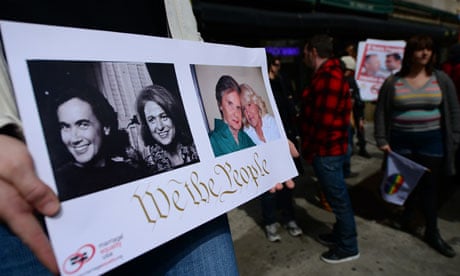

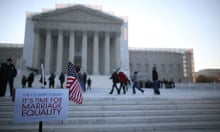



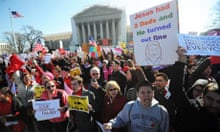

Comments (…)
Sign in or create your Guardian account to join the discussion